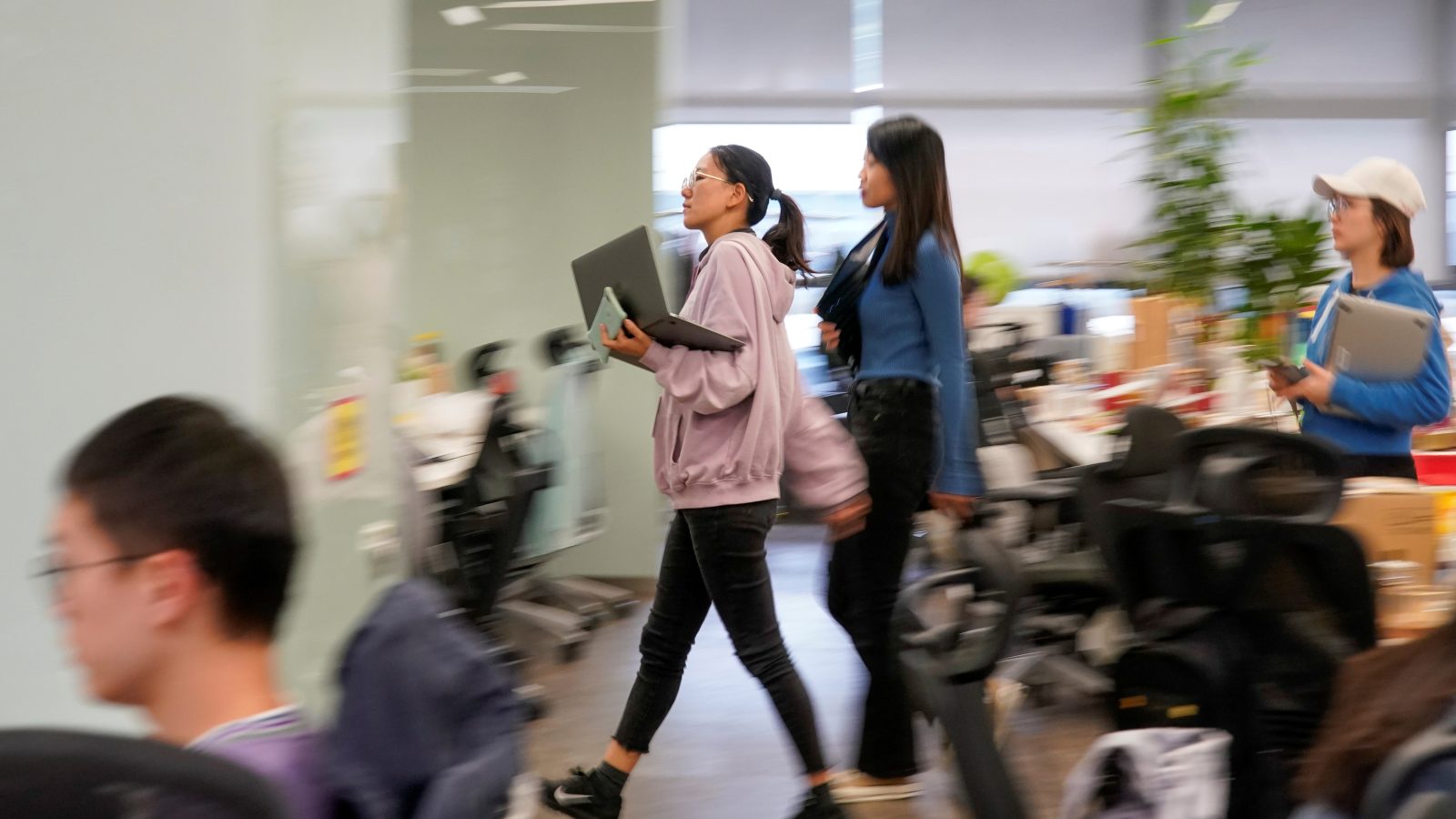Jobs
China’s AI elite rethink their Silicon Valley dream jobs

China’s elite AI tech workers are at a crossroads.
“It’s simple. Chinese professionals who specialize in AI, if given the chance, definitely [prefer to] come to the U.S. to work for top companies,” Ming Chang, who works on AI and machine learning-related products for Meta in San Francisco, told Rest of World.
But intensifying U.S.-China tech competition and fears of Chinese industrial espionage have translated into tough-on-China security and immigration screenings that are posing practical challenges for Chinese diaspora tech workers. These hurdles could deprive North American tech companies of top AI talent, experts told Rest of World.
China produces nearly half of the world’s AI talent — compared to the U.S. which accounts for 18%. China has consistently ranked as the U.S.’ biggest and most important source of high-level international STEM workers.
Zhou Yijun, a bubbly 31-year-old software engineer for Microsoft from Shanghai, said he feels content about his choice to move to Canada over the U.S. in 2018.
After completing his undergraduate degree in 2015 at a top Chinese university and working as a software engineer for HSBC, Zhou hoped to find a North American city where he could complete a master’s degree in computer science, and potentially settle for good. Trump’s unfriendly immigration policies at the time made his choice an easy one. “I thought, okay, Canada is the safer bet where I can potentially [receive] immigration status,” he told Rest of World. He completed a post-graduate degree in Vancouver and joined Huawei’s computer vision team in the city before jumping to Microsoft in 2021.
Zhou appreciates his new life in Vancouver where a large ethnic Chinese community makes the city feel “familiar,” even as he acknowledges the perks of working in the U.S., where bigger cities offer more plentiful job opportunities — and much higher salaries.
Zhou also misses the vibrancy of Shanghai, with its bars that stay open past dawn and countless restaurants. For many, China offers comfort, proximity to family, and lower cost of living, but working for a Chinese company usually means grueling hours as well as limitations on accessing cutting-edge chips and technology.
“If you asked me a decade ago, I would say there are a lot of opportunities in China since everything moves very fast. It was definitely a good place for tech workers,” Zhou said. “These days, because of the geopolitical tensions, [tools from companies like] OpenAI are not accessible in China.” Chinese tech companies “have to do everything from the ground up” because of the U.S. export controls, he said.
Despite the U.S.’ enduring appeal among China’s tech workers, visa hurdles and tough-on-China policies appear to be a rising occurrence, immigration lawyers and industry insiders told Rest of World. The U.S. government introduced the China Initiative in 2018 and Proclamation 10043 in 2020 — programs designed to protect U.S. national security, but which critics say fueled racial profiling and destroyed hundreds of legitimate careers of Chinese scientists in the U.S. Ottawa earlier this year said it would bar federal funds from flowing to researchers and organizations linked to a list of Chinese, Russian, and Iranian institutions.
While President Joe Biden scrapped the China Initiative in 2022, measures targeting China’s technology industry have continued. Biden’s administration has passed multiple export control measures designed to block China from accessing chips used to develop AI technologies, proposed restrictions on U.S. investments in Chinese tech and AI, and threatened bans on Chinese-owned platforms like TikTok.
Such policies provoke a “fear factor” among Chinese STEM workers, discouraging those in the U.S. from settling, and creating a wide perception that they would be unwelcome at American higher education institutions, Yingyi Ma, professor and director of Asian studies at Syracuse University, told Rest of World.
Chinese nationals applying to work and study in North America have been subject to greater scrutiny and drawn-out security screenings, translating into lengthy visa delays and even deportations. Silicon Valley firms including Google and OpenAI are stepping up their own security screenings of potential recruits as U.S. authorities increasingly voice espionage concerns.
“Screening for Chinese nationals has gotten tighter in the past few months … even for artists or entrepreneurs, they’re getting much more scrutiny compared to a year ago,” Toni Xu, founding attorney at Xu Law Group, who helps entrepreneurs and tech workers obtain extraordinary ability visas, told Rest of World. She attributed the heightened scrutiny to the U.S.’ “different political climate” alongside a boom in applicant numbers.
“There’s a world of difference” between the U.S. a decade ago and today, according to Xiao Wang, CEO and founder of tech-focused immigration consultancy Boundless Immigration. In today’s post-pandemic and post-low interest rate era, tech firms are laying off workers, “meaning they can’t sponsor green cards as quickly,” he told Rest of World. Heightened scrutiny on Chinese applicants and growing visa denial rates “has made it much more challenging for Chinese nationals to be able to work in the U.S,” Wang said.
“If we see more sweeping visa crackdowns, the U.S. probably will lose its top source of talent in fields like AI.”
Five staff members for tech giants including Meta in the Bay Area, who did not give their names because they were not authorized to speak with media, told Rest of World that Chinese nationals working in AI and machine learning experienced longer wait times for visas due to in-depth background checks, and have been routinely hassled and asked detailed questions when reentering the U.S.
Chinese tech workers have experienced similar troubles north of the border. In Canada, study and work permits normally require less than one year of processing time by the immigration authorities. But applications from Chinese-national tech graduates who studied at certain institutions or worked at certain companies — such as Huawei or ByteDance — are almost “definitely going to be flagged for more in-depth security checks,” said Will Tao, an immigration lawyer at Vancouver-based Heron Law who deals extensively with such cases.
Wenhu Chen, a senior research scientist at Google DeepMind and assistant professor of computer science at the University of Waterloo in Ontario, Canada, told Rest of World that background checks for Chinese nationals with a STEM background seemed to have become stricter in recent years, leading him to “lose” four talented Ph.D. students. “The students who have a strong research background … who have published a few papers are the ones who face the long checks,” Chen said.
The Canadian government doesn’t disclose what criteria immigration officials use to screen applicants, Tao said. “[Visa] applicants are struggling and under a lot of stress. They feel like they’re caught in the geopolitical crossfire.” The tighter scrutiny has delayed processing times upwards of two-and-a-half years, leading some of Tao’s clients to return to China.
The U.S. State Department did not respond to Rest of World’s request for comment. Canada’s Immigration, Refugees and Citizenship department said in a statement that applications from around the world are “assessed equally and against the same criteria. … Security screening is one, but not the only, factor that can impact processing times.”
More Chinese tech workers are now opting to stay in China due to visa uncertainties and other hindrances. Microsoft workers who recently rejected relocation offers to the West told Rest of World they are hopeful about the country’s AI ecosystem and tech job market.
China now accounts for 47% of the world’s top AI researchers compared to 29% in 2019, meaning more top global talent is working in China’s homegrown firms.
In the U.S., there is a “perfect storm” brewing that could disrupt the flow of Chinese STEM workers to the country, Ma told Rest of World.
The flow of Chinese tech talent to the U.S. has remained “resilient” in recent years, but “that resilience … has a limit,” said Matt Sheehan, an Asia program fellow at the Carnegie Endowment for International Peace, who researches technology, A.I., and U.S.-China ties. “If we see more sweeping visa crackdowns, the U.S. probably will lose its top source of talent in fields like AI.”










